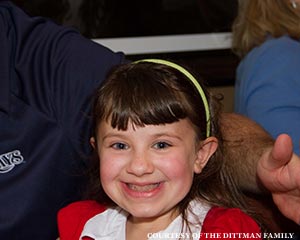
Leigh Dittman has broken 29 bones in her body and endured seven painful surgeries.
She is only 11.
With osteogenesis imperfecta (OI), a disorder that causes bones and teeth to become very brittle, Leigh knows she must always be careful -- even during a slumber party with her sisters. One minor wiggle or kick could spell disaster. "I have to place a pillow between us so I don't get hurt," says Leigh, a big sister to Taylor (6) and Skyler (5). "They like to rough-house."
When Leigh was 4 1/2, she already had a metal rod in one of her legs to help prevent injury. But when she tripped on a rug, she broke both femurs. "It actually bent the rod," says Leigh, a lifelong patient at Shriners Hospitals for Children. "The other leg broke all the way through."
Three years ago, the East-West Shrine football game, whose proceeds benefit Shriners Hospital, announced it was moving to a venue near her home in Florida from its previous location in Texas. Leigh, a huge sports fan, jumped at the opportunity to become the hospital's Patient Ambassador at the game. She participated in the official coin toss and met with the college players who were showcasing their talents for NFL scouts. And she got to tell them her story.
"You're talking about 21-year-old college guys that, quite frankly, most of them have been blessed with tremendous athletic ability and most have never even thought about Shriners Hospitals and things like that," says Harold Richardson, the Shrine Game's executive director. "But you can see them bonding with the kids and understanding what it's all about."
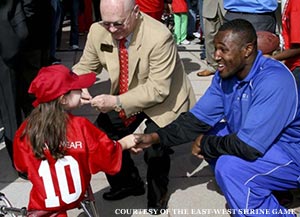
After two years in Orlando, the game makes its debut in St. Petersburg on Saturday, which is even closer to home for Leigh. Richardson is thrilled to have Leigh on board again this year to represent the nearly one million children Shriners has already helped, calling her "a living, breathing, talk-to example" of what this event stands for.
"Every penny goes to Shriners Hospital for children," says Richardson, who estimates that around 16,000 tickets have been sold for Saturday's game.
And Leigh is special because she's not only a beneficiary but also a benefactor. Leigh has personally helped raise more than $425,000 for Shriners. The Tampa Bay Business Journal honored her as its 2011 Philanthropist of the Year, and the Tampa Bay Lightning recognized her as a Community Hero.
"Kids are being transported to the hospital from all over the state. That money could be from what I've raised," she says, proudly. "To see a kid that has braces on and that my money could have helped to buy those braces or the materials that are used to build those braces -- it feels amazing."
But she's not finished yet. Her goal? $1 milllion. And she wants to become a nurse ... at Shriners.
Sports provides a diversion from the pain of her condition. Leigh loves the bond that she and her dad, David, a captain at the Tampa Fire Rescue, share for baseball, football and hockey. She remembers going to a Rays spring training game with a broken arm. Her favorite pitcher, David Price, was on the mound. She says she forgot all about her arm being in a sling.

"Whenever I watch sports, it's like all the physical challenges just disappear, and I'm right there in the sport, in the action," says Leigh, whose entire room is decorated with Tampa Bay Buccaneer memorabilia.
She also enjoys reading about her favorite sports heroes, particularly those who have persevered in the face of adversity. Her favorites? "Beyond Belief: Finding the Strength to Come Back," with Josh Hamilton, and her newest one -- "Through My Eyes," with Tim Tebow.
She was especially moved by the story of Tebow, whose mother, Pam, chose to have Tim despite being advised to terminate her pregnancy. "We both had rough starts in life," Leigh says.
Her mother, Ellen, a school teacher, says that when Leigh was born, she and David were shocked when doctors discovered she suffered five broken ribs and a broken femur inside the womb. At the time, doctors didn't quite understand the cause of the breaks or her bowed legs. She was kept in ICU for 12 days.
A geneticist came to the hospital to examine her. Aside from providing a diagnosis the next day, he could provide few answers. The couple went home with their infant daughter.
Within a few short days, the Dittmans were back. Leigh had suffered a broken arm and a broken wrist. Even to this day, Ellen still isn't sure how it happened. "She didn't cry at that moment, because I'm sure it happened in the night," she says. "But the next morning she was crying. (At the hospital) they looked at me like I was crazy. Because at the time, I couldn't spit out 'osteogenesis imperfecta.'"
Nor did she know how to care for her infant daughter whose tiny bones were so fragile, they could break upon the slightest touch.
How could she hold her?
The Dittmans came to Shriners, part of a network of 22 pediatric hospitals in North America that provides free care to children with burns and orthopedic conditions.
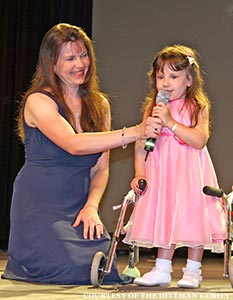
There, in Tampa, a clinical trial had just begun for pamidronate, a new drug designed to strengthen the bones of children with OI. Recent results at a similar study in Montreal looked promising.
At three weeks of age, Leigh became the youngest patient accepted into the research study.
The road ahead would be difficult. She'd need to have the drug administered intravenously for three days at a time, repeatedly. She'd need multiple surgeries. The likelihood of her being able to walk was very, very slim. But at Shriners, the Dittmans felt at home.
"It didn't feel like a hospital, it felt like family," Leigh says of her earliest memories at the hospital. "It became my home away from home."
And Ellen's fears about holding her newborn daughter? She gently placed the baby on a pillow and cradled her in her arms. "She was a 'princess on a pillow,'" she says. "That's how we carried her for a long time."
Osteogenesis imperfecta is caused by a mutation of one of the genes responsible for producing collagen.
There are varying degrees of severity, ranging from mild forms, which include a tendency to fracture before puberty with Type I, to the most severe form, Type II, which is typically fatal within the first year of life.
Leigh's condition, Type III, is considered one of the most severe forms of the disease. People with this form of OI often require "rodding," the process of surgically threading bone onto a metal rod. This is done to straighten and strengthen sites prone to fractures. Leigh has rods in both of her legs.
"Before I had my surgeries, it was highly unlikely for me to be able to walk because my legs were so bent," Leigh says. "But after surgeries, I'm able to walk using a walker."
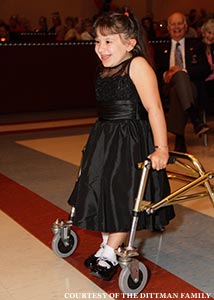
For longer distances, or in big crowds, like the ones at school and sporting events, she uses a wheelchair. It's safer that way. These precautions, along with routine treatment at Shriners, have helped her maintain an active life, although accidents can happen.
Like the time she stepped off a foot stool in the bathroom and lost her balance, coming down awkwardly onto her arm.
"That was the last time I broke," Leigh says. "Two years, knock on wood."
The breaks have come so often that she can immediately recognize the sound. But what seems terrifying to most is more of an inconvenience to her. "It doesn't scare me anymore," she says. "It's more like I get mad for being careless."
Leigh says she's learned not to be afraid of things like surgery. Her motto: "Don't think of it as something that will make you weak. Think of it as something that will make you stronger."
But she admits sometimes she needs Mom for comfort. "Who doesn't want their mom to hold their hand and tell them it will be all right?" she says.
Just before Leigh turned 3, Ellen and David asked her what she wanted to do for her birthday. She told them she wanted to have a party.
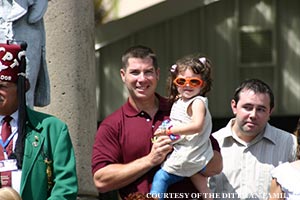
Having already been treated for multiple fractures and falls at Shriners, she told them instead of receiving toys as gifts, she'd like money to give to the hospital.
"The hospital deserves every penny because they're doing so much for me and they're not asking for a single dollar," Leigh recalls saying to her parents.
An idea was born. The Dittmans invited their close family and friends, and that eventually grew into an annual fundraiser that has become a major event in the Tampa Bay region.
And Leigh, with her sparkling eyes, infectious smile, and natural-born charisma, quickly became the face of Shriners, attracting the attention of some big-time local sports stars. Price and Hamilton are among those who have supported the cause, and so have Michael Clayton and Jon Gruden, both formerly of the Buccaneers.
Those times when Leigh can meet star athletes are all the more special because she still has to endure rough moments.
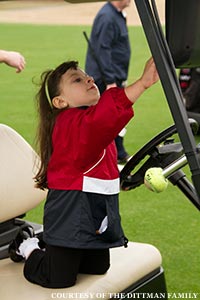
"We had a hard time putting her in school ... because people don't understand," says Ellen, who was once told by an adviser that the gifted program may be too much for Leigh, a straight-A student, because she's in a wheelchair.
"I said, 'You don't know my daughter.'"
Leigh admits people can be cruel. They stare and sometimes say hurtful things. On field trips adults assume she's much younger. She politely reminds them that she's 11, or asks, "When can we learn about photosynthesis?"
One time Ellen caught two women staring in the mall and overheard them saying, "Look at that child. How could that child be that little in a cast? I wonder what her mom did to her?" Another time, somebody called Leigh a "talking midget."
But words can be a lot like surgery: "Don't think of it as something that will make you weak. Think of it as something that will make you stronger."
Her many milestones are proof.
At this year's game, Martin Gramatica and Joey Harrington will be inducted into the East-West Shrine's Hall of Fame. Gramatica and Harrington went on to have NFL careers and launched organizations that directly benefit sick children, including those at Shriners.
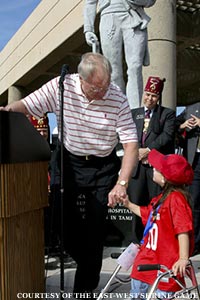
"For a lot of the guys, it's probably the first time they've sat and [said], 'You know, I'm pretty lucky to be able to do all the things that I do," says Richardson, who hopes that more players will follow the lead of Gramatica and Harrington. "It's not about any particular cause or place they embrace. It's about finding something in their life that they can do that is worthwhile in the sense of giving back and helping somebody else."
Or as Leigh (pictured with coach Marty Schottenheimer), who was blessed with an extraordinary gift to communicate and endear herself to people of all ages, puts it:
"Whatever your heart feels like you can do to give back to the community, do it. If it's raising money, if it's just telling people about what Shriners does, if it's just spreading the news, do it.
"Follow your heart and it will tell you how to give back."
-- Visit their websites to learn more about Leigh Dittman and East-West Shrine Game.
Popular Stories On ThePostGame:
-- Billy Donovan's Secret Sorrow
-- NBA Announcer Chris Carrino: My Battle Against FSHD Muscular Dystrophy
-- Fighting Cancer With The Stars
-- Remembering Lee Roy Selmon, The Greatest Buc Of All








